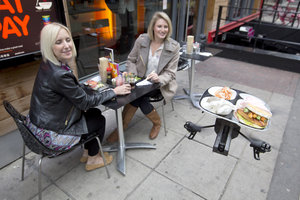Drone waiters appear in Singapore's service staff
Food is a national obsession in Singapore and finding enough people to bring the food is increasingly becoming a problem. One company thinks it has come up with a solution - flying robot waiters. They are sturdy, reliable, and promise never to call in sick at the last minute.
 Infinium Robotics' drones, due to be introduced at a local restaurant-bar chain by the end of this year, can carry up to 2kg (4.4lbs) of food and drink - that's about two pints of beer, a pizza, and two glasses of wine.
Infinium Robotics' drones, due to be introduced at a local restaurant-bar chain by the end of this year, can carry up to 2kg (4.4lbs) of food and drink - that's about two pints of beer, a pizza, and two glasses of wine.
Keen on slowing down immigration and increasing efficiency, the government has put curbs on the cheap foreign labour on which the restaurant industry has long depended. The unpiloted robots whizz above the heads of diners on paths charted by a computer programme, and navigate using infra-red sensors placed around the restaurant. But young Singaporeans tend to shun service jobs due to their lower wages and perceived lower social status. A lot of well-known restaurants and food stalls have shut down in recent months citing the manpower shortage and high rentals, causing some handwringing over the future of Singapore's food culture.
Restaurateurs have been experimenting with ways to address the shortage, from robots that can wok-fry rice and noodles to iPad menus and bullet train delivery systems. None, however, has so far gone to the extent of having robots fly around serving food to diners. Infinium Robotics' chief executive officer Junyang Woon claimes in a message that his technology frees up capacity: "So staff are able to interact more with customers and enhance their dining experience."
Drones can pose safety and liability issues, especially when used indoors, because they should provide security. In December, a drone crashed into someone's face at a TGI Fridays outlet in New York. But Mr Woon says their machines use onboard cameras and sensors to ensure they do not collide with one another or with people. Their blades are covered with grates.
Can it really be a long-term solution?
Non-profit director Stacey Choe, who eats out four times a week, balks at the idea of drone waiters. "It provides efficiency especially at bigger establishments. So it could well be the future. I would be keen to try it, it's a novelty - but it's something that's not very attractive in the long run. I just think service needs to feel personal," she says.
Even the chain that's buying Infinium's drone waiters, the Timbre Group, admits that there are limits to the technology. Managing director Edward Chia currently employs 90 people across six restaurants and bars. He says that with the drones - he plans to use 40 of them - he now has the capacity to open more outlets and redirect staff to do higher-skilled jobs, such as making cocktails and preparing food. But he still plans to have human waiters - the drones will ferry food from the kitchen to a serving station, and a person will then place the dish in front of the customer. "We still want to have that human touch," he says. At the same time nobody knows how hackers can use such drones, but they increase threats to security and privacy.
Axarhöfði 14,
110 Reykjavik, Iceland














